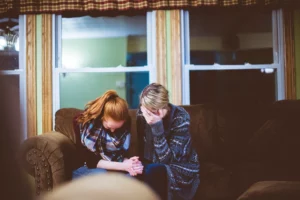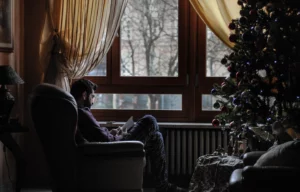With many people suffering from loss because of Covid-19 and the holidays approaching, for some, “the most wonderful time of the year” is not feeling as “cheerful and bright”. Even the most loving families can experience tension when they are grieving, especially during the holidays. While it may seem tempting to pretend Christmas doesn’t exist, temporarily avoiding the pain only prolongs the anguish. So how does one cope with grief during the festive season? Take the time to acknowledge the grief in your life and use these tips to support yourself and your loved ones:
Keep the memory of your loved one alive. Set a place for them at the table. Honor them by preparing and enjoying their favourite recipe. Donate the money you would have spent on a gift for them to a cause that was important to them. Encourage memories and share stories with others about them. Bring out old photo albums and reminisce about the good times spent together. Light a candle in your home in memory of the person you’ve lost. Dedicate a moment of silence in your holiday prayer or toast to them.

Don’t feel obligated to keep up with family traditions. You can’t do it all and you don’t have to. Some people find strength in long-established traditions, while others may choose to avoid customs of the past and do something new. If it doesn’t feel right, give yourself permission to skip it this year and see if you want to continue the tradition next year instead. It’s okay to do things differently.
Share your loved one with others. This is not only the perfect time to share memories of your loved one, but also to share cherished items. Gift special items to family members who will appreciate them and donate clothing to families in need or to homeless shelters. You will feel better having donated to those less fortunate and also letting go of some material things will help lighten the emotional load a little.
Practice compassion for yourself. It’s okay not to send holiday cards. Don’t fret about putting up ALL the decorations, you’ll see plenty outside of your home. Skip any holiday events you don’t feel comfortable attending and don’t feel bad. Putting too many activities in your schedule can be overwhelming when you are grieving. It is enough to say, ‘I don’t have it in me this year to attend, but I appreciate the invitation.’ When you do go to holiday parties, if you find yourself enjoying yourself, it is ok if you are – your loved one would likely be happy that you are. Try not to be hard on yourself if you are finding small moments of joy. Being around other people can be helpful, so find comfort in the company of friends or family. Talk about feelings of guilt with your children who may think they shouldn’t be happy or have fun without the person you’ve lost. Let them know it’s okay to be happy and it’s okay to be sad too.

Practice compassion for others. Try to remember that not everyone grieves the same. The way others want to spend the holidays may not be the same as how you would like to spend them. Plan ahead, when possible, so everyone is in agreement about traditions and plans. You do not have to put up with abusive behaviour, but it helps to consider others’ points of view before deciding how to deal with their behaviour. Sometimes simply being together is enough to support each other in your shared grief.
Practice self-care and self-kindness. Take some time for yourself and be kind to your body too. Whatever it is that helps you to recharge, do it. Whether that means 15 minutes of meditation or an hour of walking outside, a bit of physical activity will boost your mood and help you sleep better. Get outside in the fresh air and enjoy the sights, sounds, and scents of this time of the year to help decrease stress and increase relaxation. Getting through the holidays won’t be any easier if you are hard on yourself. Acknowledge that you are doing your best and it’s not easy.

Resist the urge to over-indulge. While it may feel good to eat an entire box of chocolates or a tin of shortbread in the moment, you might feel awful later when the dopamine-fueled sugar rush wears off. The same goes for alcohol. Taking care of yourself physically will give you the strength you need to cope with the “down” days. Don’t deprive yourself, but be careful that you don’t let food or alcohol become your holiday comfort. If you do find yourself on the downside of over-indulgence, try to get out for a walk with a friend or your dog (if you have one), the fresh air and exercise will help you feel better.
Ask for help and accept help when offered. Say YES to people who want to help and offer their support. Oftentimes we feel uncomfortable asking for help; we think we can handle it on our own and don’t seek support, maybe because we don’t want to inconvenience or put our emotional burdens on others. It’s okay to admit that you are struggling with your grief. Most people don’t know how they can help unless you tell them. If you need help cooking the holiday meal or putting up the holiday decorations, ask. Most people find the support of their close friends and family enough to manage on their own to get through the holidays, but if you are finding it difficult to look after yourself on a day-to-day basis, it may be helpful to see a counselor or other mental health professional.

Even if you just pick a couple of these tips to practice during this holiday season, you will be able to create a bit more space for peace and mental calmness, even in the most difficult circumstances. Learning new coping skills can take time, so put them into practice starting now. Given the hustle and bustle of the season, some people may make it through the holidays with no issues, but they may find the post-holiday period more difficult. Check-in with your family and friends in mid-January and remember that these tips can be helpful in coping with grief year round. If you feel your grief is unmanageable or you just simply need someone outside your group of friends or family to talk to about your grief, our therapists can help. Our Edmonton therapists are trained in grief and loss and will be there to help you through the your grief recovery.
